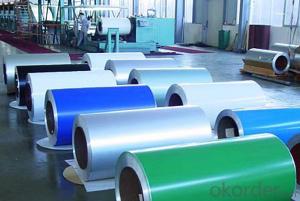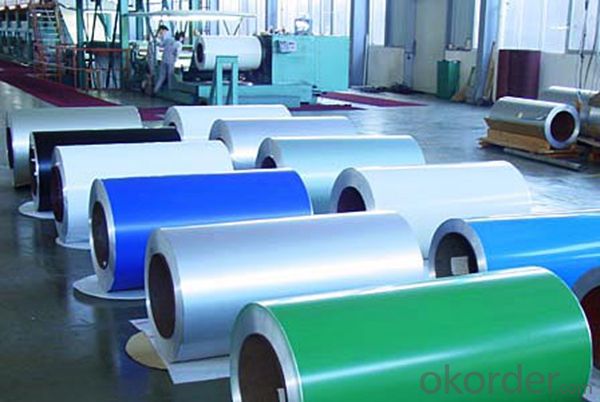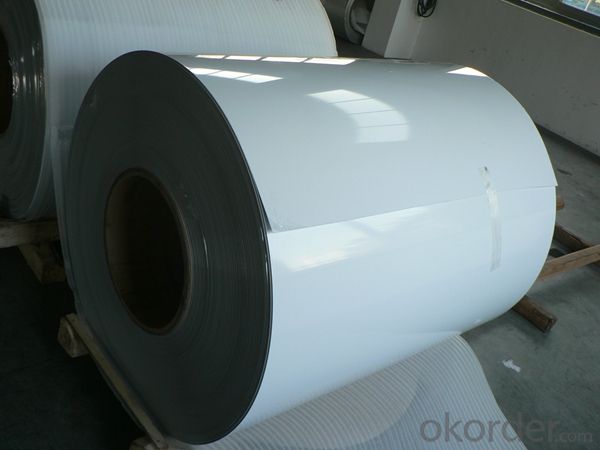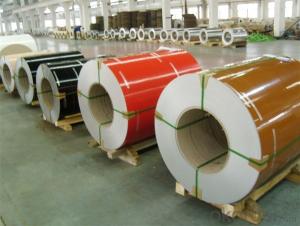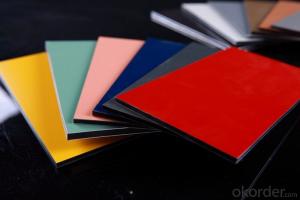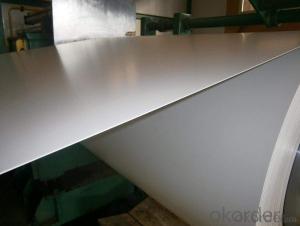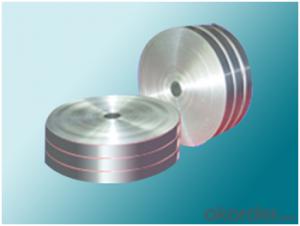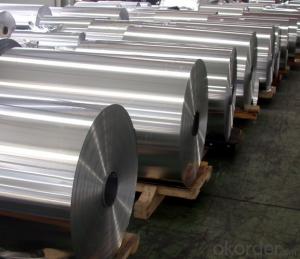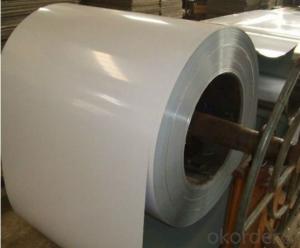Wholesale Aluminum Roof Coil - Color Coating Aluminum Coil PVDF Painting for Outer Doors
- Loading Port:
- Shanghai
- Payment Terms:
- TT OR LC
- Min Order Qty:
- 5 m.t.
- Supply Capability:
- 10000 m.t./month
OKorder Service Pledge
OKorder Financial Service
You Might Also Like
Specification
1. Specification of Color Coating Aluminium Coil PVDF Painting for Outer Doors
Material | Alloy Aluminum 1XXX,3XXX,5XXX or customer nominated |
Temper | T3, T4, T5, T6 |
Surface | Anodize, electrophoresis, powder coating,PVDF coating, wood grain painting, matted, etc. |
Colour | Any colour based on Standard Germany RAL Mark |
Length | Coating 6.5 meters, Anodizing 6.5 meters, Mill finish 5 meters |
Press Machine | 500-4000 tons all together 64 press lines. |
Fabrication | 1. Windows and doors; 2. Drilling; 3. Bending; 4. Cutting; 5. etc. |
Certificate | ISO 9001 |
Moulding | 1. Using our moulds, no fee; |
2. Using customer drawing, opening mould, usually about 10~50 tons then the moulding can be refunded. | |
3. Mould cost is negotiable base on the order quantity | |
Capability | Annual output 100,000 tons |
2. Application of Color Coating Aluminium Coil PVDF Painting for Outer Doors
(1).Interior: wall cladding, ceilings, bathrooms, kitchens and balconies, shutters, doors...
(2).Exterior: wall cladding, facades, roofing, canopies, tunnels,column covers , renovations...
(3).Advertisement: display platforms, signboards, fascia, shop fronts...
3. Feature of Color Coating Aluminium Coil PVDF Painting for Outer Doors
Be free from Oil Stain, Dent, Inclusion, Scratches, Stain, Oxide Dicoloration, Breaks, Corrosion, Roll Marks, Dirt Streaks and other defect which will interfere with use
4. Certificate:
SGS and ROHS(if client request, paid by client), MTC(plant provided), Certificate of Origin(FORM A, FORM E, CO), Bureau Veritas and SGS (if client request, paid by client), CIQS certificate
5. Image of Color Coating Aluminium Coil PVDF Painting for Outer Doors
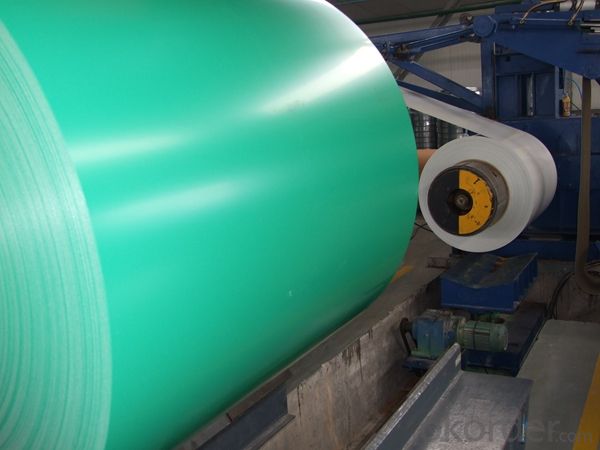
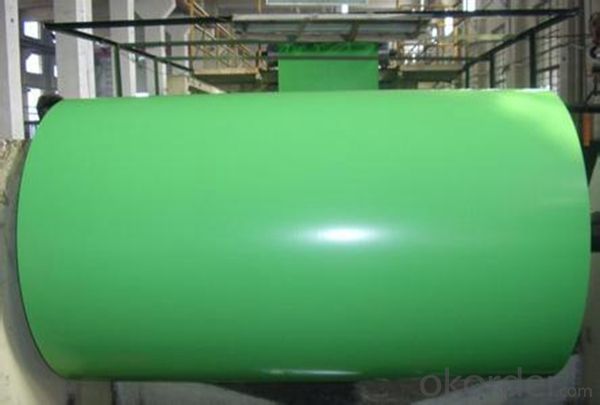
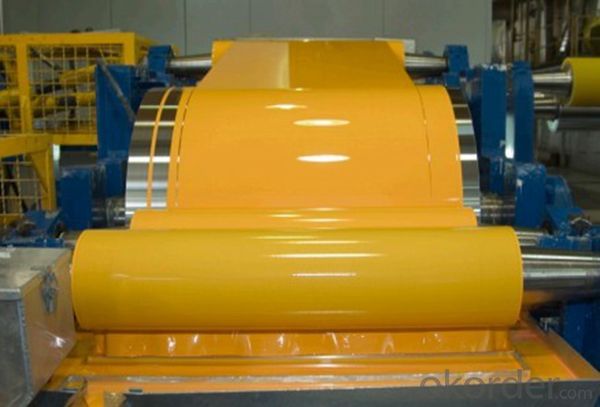
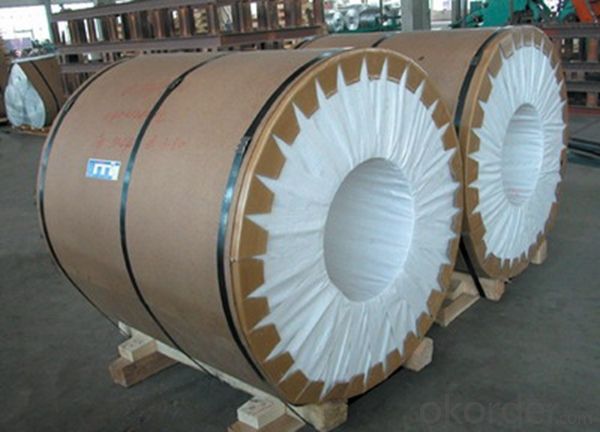
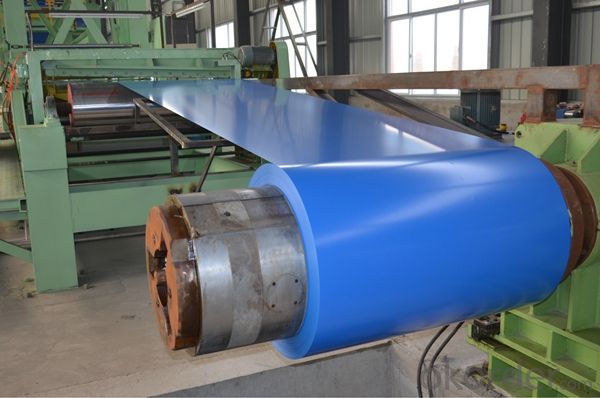
6. Package and shipping of Color Coating Aluminium Coil PVDF Painting for Outer Doors
eye to wall
eye to the wall
with wood pallet (wooded case also available)
7. FAQ
1) What is the delivery time?
Dpends on actual order, around 20 to 35 days
2)What is the QC system:
We have QC staff of 20 persons and advanced equipment, each production is with MTC traced from Aluminum ingot lot.
3) What market do you mainly sell to?
Australia, America, Asia, Middle East, Western Europe, Africa etc
- Q: How are aluminum coils used in the production of automotive radiators?
- Due to their exceptional heat transfer properties and lightweight nature, aluminum coils are widely utilized in the production of automotive radiators. These coils are typically crafted from high-quality aluminum alloy, which offers superior thermal conductivity compared to other materials. In the manufacturing process, aluminum coils undergo initial shaping to achieve the desired configuration for the radiator's core. This can be accomplished through various methods, such as extrusion or rolling. Once shaped, the coils are meticulously stacked and bonded together to create a robust and efficient heat exchanger. The primary function of aluminum coils in automotive radiators is to facilitate the transfer of heat from the engine coolant to the surrounding air. As the hot coolant flows through the radiator's tubes, the aluminum coils efficiently absorb and disperse this heat. The coils' large surface area, combined with their excellent thermal conductivity, ensures effective heat dissipation. Additionally, the lightweight nature of aluminum makes it an ideal material for automotive radiators. By reducing the weight of vehicles, aluminum coils contribute to improved fuel efficiency and overall performance. Compared to traditional copper or brass counterparts, aluminum coils offer a lighter radiator. Furthermore, aluminum coils provide several other advantages in radiator production. They possess corrosion-resistant properties, which enhance the radiator's lifespan and durability. Aluminum coils also enable more flexible designs, allowing for the creation of radiators with intricate shapes and configurations to accommodate various vehicle models. In conclusion, aluminum coils play a critical role in the production of automotive radiators. Their exceptional heat transfer properties, lightweight nature, corrosion resistance, and design flexibility make them an optimal choice for manufacturing efficient and reliable radiators for automobiles.
- Q: What are environmentally friendly types of aluminum coil and do they exist?
- <p>Yes, there are environmentally friendly types of aluminum coil. These include recycled aluminum coils, which are made from aluminum that has been reprocessed and reused, reducing the need for new aluminum production and its associated environmental impact. Additionally, aluminum coils with a high recycled content are considered eco-friendly as they contribute to waste reduction and energy conservation. The production of recycled aluminum uses significantly less energy compared to virgin aluminum, making it a more sustainable choice.</p>
- Q: Is it possible to recycle aluminum coils?
- <p>Yes, aluminum coil can be recycled. Recycling aluminum is a highly efficient and environmentally friendly process. It requires only 5% of the energy needed to produce new aluminum from raw materials. Recycled aluminum coils can be used to manufacture new aluminum products, reducing waste and conserving resources. The recycling process typically involves melting the aluminum, which can then be reshaped into new coils or other forms. This makes aluminum one of the most recycled materials in the world.</p>
- Q: How are aluminum coils coated or finished?
- Aluminum coils are commonly coated or finished through processes such as painting, anodizing, or laminating. Painting involves applying a protective layer of paint or coating onto the aluminum surface to enhance its appearance and protect it from corrosion. Anodizing, on the other hand, involves creating a controlled oxide layer on the surface of the aluminum, which provides durability, improved color options, and resistance to corrosion. Laminating is another method where a protective film or layer is added to the aluminum coil, providing additional protection and improving its aesthetic appeal.
- Q: Are there any health or safety concerns related to aluminum coils?
- Aluminum coils have the potential to present health and safety risks, particularly in certain situations. One concern is the possibility of aluminum particles or fumes being released into the air, especially during the manufacturing or processing of the coils. Inhaling these particles or fumes could result in respiratory problems or lung damage. Moreover, damaged or corroded aluminum coils might release aluminum ions into food or drinks, which could be harmful if consumed excessively. Nonetheless, it is worth noting that the risks associated with aluminum coils are generally minimal and can be reduced through proper handling and upkeep. Manufacturers typically implement various safety measures to prevent the release of aluminum particles or fumes during production. Additionally, aluminum coils used in heating, ventilation, and air conditioning systems are usually coated or treated to prevent corrosion and the subsequent leaching of aluminum ions. To minimize any potential health risks, it is advisable to adhere to safety guidelines provided by manufacturers. This may involve wearing appropriate protective gear when handling aluminum coils and ensuring adequate ventilation in areas where they are processed or installed. Regular inspection, cleaning, and maintenance of the coils can also help identify and resolve any potential issues before they become a matter of health or safety. In conclusion, although there are concerns regarding the health and safety implications of aluminum coils, these risks can be managed through proper handling, maintenance, and adherence to safety guidelines. Seeking advice and recommendations from professionals or manufacturers regarding the utilization and upkeep of aluminum coils is always recommended to ensure maximum safety.
- Q: Are aluminum coils easy to install?
- Yes, aluminum coils are generally easy to install. They are lightweight and flexible, which makes them easier to handle and maneuver during installation. They can be easily cut and shaped to fit the specific requirements of the installation, and they are often available in pre-cut sizes, further simplifying the installation process. Additionally, aluminum coils are typically designed with features such as interlocking edges or snap-on connectors, which make it easier to join multiple coils together or connect them to other components. Overall, with the right tools and basic knowledge of HVAC installation, aluminum coils can be installed relatively easily.
- Q: Can aluminum coils be used in heat exchangers?
- Indeed, heat exchangers can utilize aluminum coils. The utilization of aluminum in heat exchangers is prevalent owing to its exceptional thermal conductivity and resistance to corrosion. Aluminum's remarkable thermal conductivity enables efficient heat transfer, rendering it an optimal substance for heat exchangers. Furthermore, the coils' endurance and functionality in challenging surroundings are guaranteed by aluminum's resistance to corrosion.
- Q: Are aluminum coils resistant to fire?
- Aluminum coils are widely recognized as being fire-resistant. They possess a high melting point of 660 degrees Celsius, which is considerably higher than the typical temperature of most household fires. Consequently, aluminum coils are a favored choice for diverse applications requiring fire resistance, including the construction of buildings, electrical systems, and automotive components. Moreover, aluminum exhibits low flammability and does not emit toxic fumes when exposed to fire, further heightening its fire-resistant characteristics. Nonetheless, it is vital to acknowledge that the fire resistance of aluminum coils may vary depending on the specific alloy employed and the thickness of the coil. Hence, it is always advisable to seek advice from experts or adhere to industry standards to guarantee the implementation of appropriate fire safety precautions.
- Q: How are aluminum coils protected against moisture during storage?
- Various methods and materials are typically employed to safeguard aluminum coils against moisture during storage. One commonly utilized technique involves the application of a protective coating, such as a thin layer of oil or a corrosion-resistant film, which establishes a barrier between the coil and any moisture present in the surroundings. This coating effectively prevents direct contact between the aluminum surface and water, thereby minimizing the likelihood of corrosion or other forms of moisture-induced harm. In addition to protective coatings, it is possible to store aluminum coils in a controlled environment with low humidity levels. This can be accomplished by placing the coils in a dry warehouse or utilizing dehumidifiers to eliminate excess moisture from the storage area. By regulating the humidity, the probability of moisture condensation on the coils is diminished, affording them further protection against potential damage. Moreover, appropriate packaging plays a vital role in shielding aluminum coils from moisture during storage. Frequently, the coils are enveloped in moisture-resistant materials, such as plastic or moisture-proof paper, which create a barrier to prevent moisture from reaching the coils. Additionally, the packaging is often sealed to establish an airtight environment, thereby minimizing the chances of moisture infiltration. Regular inspection and maintenance are also crucial to ensure the ongoing protection of aluminum coils during storage. This entails examining the integrity of the protective coatings, monitoring the storage environment for any fluctuations in humidity levels, and promptly addressing any indications of moisture damage. On the whole, the utilization of protective coatings, controlled storage environments, appropriate packaging, and regular maintenance are key elements in safeguarding aluminum coils against moisture during storage. By implementing these measures, the risk of moisture-related damage is significantly reduced, ensuring the coils' quality and integrity until they are ready for utilization.
- Q: What are the common safety precautions when working with aluminum coils?
- To ensure the safety of individuals and prevent accidents, it is crucial to follow several safety precautions when handling aluminum coils. Here are some commonly recommended safety measures: 1. Personal Protective Equipment (PPE): It is essential to wear appropriate safety gear, such as safety goggles, gloves, and aprons, while working with aluminum coils. This protective equipment is necessary to safeguard against potential injuries from sharp edges, cuts, or burns. 2. Proper Handling Techniques: To avoid strain or injury, it is important to use proper lifting techniques while handling aluminum coils. Since these coils can be heavy, lifting with your legs instead of your back and using lifting aids or equipment, if required, is crucial. 3. Secure Storage: To prevent any accidents, it is vital to securely store aluminum coils. Avoid stacking them too high to prevent them from falling or rolling over and causing injuries. 4. Adequate Ventilation: To prevent the buildup of fumes or dust particles, it is important to ensure that the work area has proper ventilation. Aluminum coils may release harmful particles or gases during cutting or processing, making proper ventilation necessary for maintaining a safe working environment. 5. Fire Safety: Due to the high flammability of aluminum, it is extremely important to avoid sparks or open flames near aluminum coils. Using non-sparking tools and refraining from smoking or using flammable materials in the vicinity is crucial. 6. Sharp Edges: It is important to be cautious of sharp edges on aluminum coils as they can cause cuts or lacerations. Handling coils with care and using appropriate tools can help mitigate the risk of injury. 7. Training and Safety Guidelines: All personnel working with aluminum coils should receive proper training on handling procedures and safety guidelines. This includes knowing how to correctly use equipment, understanding emergency procedures, and being aware of any specific hazards associated with aluminum coil handling. 8. Regular Maintenance: Regularly maintaining equipment and tools is necessary to ensure they are in good working condition. This involves inspecting and repairing any damaged or worn-out parts that could pose a safety risk. 9. First Aid and Emergency Response: Keeping a well-equipped first aid kit nearby and ensuring that employees are aware of its location is important. Additionally, establishing clear emergency response protocols and training employees on what to do in case of an accident or injury is crucial. By following these common safety precautions, individuals can minimize the risks associated with working with aluminum coils and create a safer working environment.
Send your message to us
Wholesale Aluminum Roof Coil - Color Coating Aluminum Coil PVDF Painting for Outer Doors
- Loading Port:
- Shanghai
- Payment Terms:
- TT OR LC
- Min Order Qty:
- 5 m.t.
- Supply Capability:
- 10000 m.t./month
OKorder Service Pledge
OKorder Financial Service
Similar products
Hot products
Hot Searches
Related keywords
